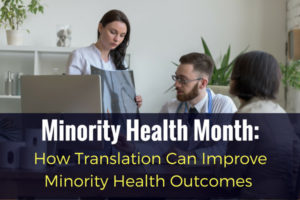April is National Minority Health Month, and this year's theme is "Bridging Health Equity Across Communities." But right now, in too many communities, health outcomes are anything but equitable.
Here, courtesy of Aetna, are just a few of the many examples:
- When it comes to cancer, African-Americans have the highest death rates and the shortest survival times.
- African-Americans are twice as likely to get diabetes as white Non-Hispanics. Meanwhile, Hispanics are 1.7 times as likely to be diagnosed with diabetes and 1.5 times as likely to die.
- African-Americans are 60% more likely to have a stroke than white adults.
Here are four ways translation can help address these disparities and improve minority health outcomes.
Improving Health Literacy
According to the US Department of Health and Human Services website, health literacy is "the degree to which individuals have the capacity to obtain, process, and understand basic health information and services needed to make appropriate health decisions."
It's imperative that health information is not just readable, but understandable. Medicine is complex. Health insurance is complex. Even highly educated, highly literate native English speakers get lost in the maze of medical terms and industry jargon.
In fact, only 12% of US adults have "proficient health literacy skills" according to the National Assessments of Adult Literacy. Add a language barrier, and comprehension goes down.
This issue is much more than a simple inconvenience, and it affects all of us. People with low health literacy are more likely to report their health as poor, more likely to miss out on preventative care, and more likely to need hospitalization and emergency care.
Translation can improve health literacy by ensuring information about health care and health insurance is accessible to minority communities and available in commonly spoken community languages. At VIA, we recommend writing and translating healthcare materials at a 4th to 6th-grade level to ensure understanding.
Did you know? Professional translators can reduce the grade level of written content by up to two grade levels.
Translating Public Health Information
Public health information campaigns have had a major impact in improving health over the past century. These days, insurance companies have an important role to play in these campaigns. After all, while improving members' health through prevention is the main benefit, cost control is an important side benefit.
But as any good marketer will tell you, you have to reach people on a deep emotional level if you want them to change their behavior. To be effective, messages must be targeted toward the communities they're intended for.
Translation is essential, but it's not always enough. Transcreation requires additional skills on the part of the translator, but it often yields better results. Through transcreation, language service providers can "recreate" campaigns while taking cultural differences into account, more effectively reaching and motivating target audiences.
Ensuring Compliance and Facilitating Communication Between Patients, Providers and Insurance Companies
There's no doubt that language barriers impede care for patients with limited English proficiency in the following ways:
- Difficulty getting information from a physician.
- Having to use unqualified family members (often children) as interpreters.
- Difficulty understanding insurance plans and benefits.
It's vital that everyone involved in a patient's healthcare be able to understand each other. That includes the patient.
Translation can help. And as a result of these issues, government regulations at all levels mandate that consumers have access to healthcare information in their own language in at least some circumstances.
Complying with these regulations ensures patients have access to information about their medical treatments, insurance, and benefits. (It also keeps your organization out of trouble!)
Ensuring Medical Accuracy
Medical errors are a real problem, and they have a disproportionate effect on patients with low English proficiency.
For example, a 2007 study found that "49.1% of limited English proficient patient adverse events involved some physical harm whereas only 29.5% of adverse events for patients who speak English resulted in physical harm." Accurate translation and access to interpreters are vital to patient safety!
In today's multicultural world, healthcare organizations of all stripes need skilled translation services from native-speaking translators with specialized medical translation knowledge.
At VIA, we combine professional translation services with an award-winning translation process to minimize cost and turnaround time. Want to learn more? Give us a call at 1-800-737-8481 today!

